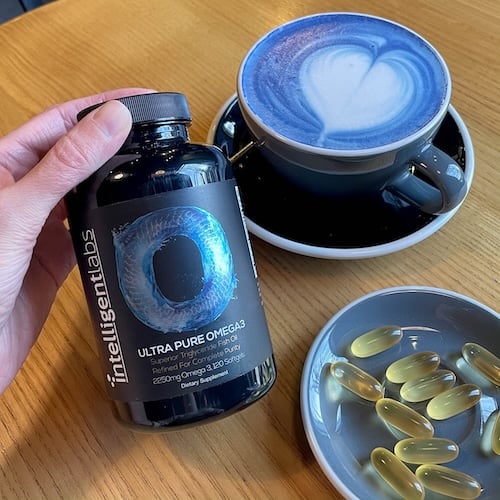Omega-3 fatty acids are essential nutrients known for supporting heart health, brain function, and reducing inflammation. If you’re taking an omega-3 supplement or considering starting, you might wonder when the best time is to take them for maximum benefit.
Morning or night: When should you take Omega-3?
Truthfully, there isn’t a universally “best” time of day to take omega-3 supplements. Consistency is far more important. Taking your supplement at the same time each day helps maintain steady levels of omega-3 fatty acids in your system, enhancing their effectiveness over time.
The choice between taking omega-3 supplements in the morning or at night often comes down to personal preference and routine:
Morning intake
Some people prefer taking omega-3 supplements in the morning to kickstart their day with energy. Pairing omega-3s with a morning supplement like our Probiotics can promote good gut health.
Evening intake
Others opt to take omega-3 supplements at night, especially if they consume their largest meal in the evening. Taking omega-3 with a heavier, fat-containing meal can enhance absorption. Moreover, pairing it with a magnesium supplement like MagEnhance can promote relaxation and support sleep quality.
Should you take Omega-3 on an empty stomach or with food?
Regardless of the time of day you choose, it’s important to take omega-3 supplements with a meal that contains healthy fats. This practice improves the absorption of the fatty acids.

Fat in your meal stimulates the release of digestive enzymes like pancreatic lipase, which helps break down omega-3 triglycerides for absorption in the small intestine.1
For example, one study found that a meal containing 44 grams of fat increased omega-3 absorption by 300% compared to a meal with 8 grams of fat.2
Another study recorded a 400% increase in absorption rates when omega-3 was taken with a high-fat meal.3
Choosing the right form: Triglyceride vs. Ethyl Ester
Not all omega-3 supplements are equal. The form you choose – triglyceride or ethyl ester – impacts absorption and effectiveness.
Omega-3s in the triglyceride form closely resemble how they naturally occur in foods like fish. This form is better absorbed by the body and typically causes fewer digestive issues, such as fishy burps. Additionally, triglycerides don’t rely as heavily on high-fat meals for absorption, making them a more reliable choice.1 2 4
In contrast, ethyl ester fish oil is a processed form of omega-3. Although still beneficial, ethyl esters are absorbed 10 to 50 times less efficiently due to their altered chemical structure. Studies show that absorption can be 300-400% lower compared to triglycerides, especially when taken with low-fat meals, and they may also cause more digestive discomfort.4 5
Related article: What’s The Difference Between Triglyceride And Ethyl Ester Omega-3 Fish Oil?
Addressing common digestive concerns
Some people experience digestive discomfort when taking omega-3 supplements, such as fishy burps or indigestion. Here are tips to minimize these issues:
- Take with meals: As mentioned above, consuming your Omega-3 with a fat-containing meal can reduce digestive discomfort.
- Choose burpless formulas: Our Ultra Pure Omega-3 supplement is designed to be “burpless”, minimizing the risk of fishy aftertaste. We do not use enteric coating in our softgels because it can reduce absorption.
- Start with a lower dose: Our recommended daily serving is 3 softgels, providing a total of 2,250mg of omega-3 fatty acids. However, if you’re just starting, you can begin with one or two softgels per day and work your way up to the full dose as your body becomes accustomed to it.
Conclusion
The best time to take omega-3 supplements is the time that fits best with your routine and ensures consistency. Remember to take your supplement with a meal containing healthy fats to maximize absorption, and consider pairing it with other supplements that align with your health goals.
References:
- Schuchardt, Jan Philipp, and Andreas Hahn. “Bioavailability of Long-Chain Omega-3 Fatty Acids.” Prostaglandins, Leukotrienes and Essential Fatty Acids, vol. 89, no. 1, July 2013, pp. 1–8, https://doi.org/10.1016/j.plefa.2013.03.010.
 ︎
︎ - Lawson, Larry D., and Bronwyn G. Hughes. “Absorption of Eicosapentaenoic Acid and Docosahexaenoic Acid from Fish Oil Triacylglycerols or Fish Oil Ethyl Esters Co-Ingested with a High-Fat Meal.” Biochemical and Biophysical Research Communications, vol. 156, no. 2, Oct. 1988, pp. 960–963, https://doi.org/10.1016/s0006-291x(88)80937-9.
 ︎
︎ - Kling, Douglas F., et al. “Omega-3 Free Fatty Acids Demonstrate More than 4-Fold Greater Bioavailability for EPA and DHA Compared with Omega-3-Acid Ethyl Esters in Conjunction with a Low-Fat Diet: The ECLIPSE Study †.” Journal of Clinical Lipidology, vol. 5, no. 3, May 2011, p. 231, https://doi.org/10.1016/j.jacl.2011.03.062.
 ︎
︎ - Beckermann, B., et al. “[Comparative Bioavailability of Eicosapentaenoic Acid and Docasahexaenoic Acid from Triglycerides, Free Fatty Acids and Ethyl Esters in Volunteers].” Arzneimittel-Forschung, vol. 40, no. 6, 1 June 1990, pp. 700–704, pubmed.ncbi.nlm.nih.gov/2144420/.
 ︎
︎ - Yang, L. Y., et al. “Lipolysis of Menhaden Oil Triacylglycerols and the Corresponding Fatty Acid Alkyl Esters by Pancreatic Lipase in Vitro: A Reexamination.” Journal of Lipid Research, vol. 31, no. 1, 1 Jan. 1990, pp. 137–147, pubmed.ncbi.nlm.nih.gov/2313198/.
 ︎
︎
The post What’s The Best Time To Take An Omega-3 Supplement? appeared first on Intelligent Labs.



